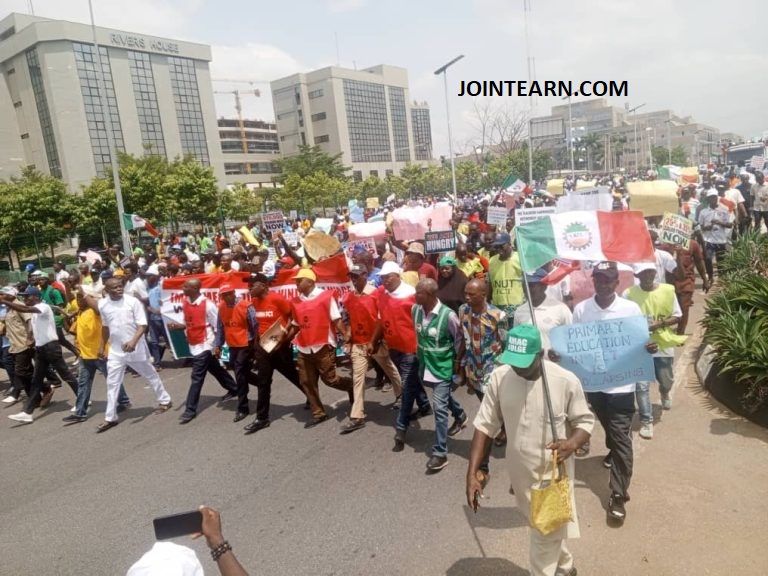Teachers and workers employed under the Federal Capital Territory (FCT) Administration have staged a protest in Abuja, demanding the immediate payment of unpaid wages, arrears, and other entitlements. The protest, which took place at the entrance of the FCT Administration offices, saw hundreds of teachers, council workers, and their unions expressing their frustration over the prolonged delays in salary payments and benefits.
The demonstration has drawn attention to the worsening conditions of public sector workers in the FCT, many of whom claim they have not received their full salaries for several months. The workers, who include teachers in primary and secondary schools, as well as employees of various local councils, are calling on the FCT government to address their grievances without further delay.
The Protest: Workers Demand Immediate Action
The protest, organized by the Nigerian Union of Teachers (NUT) and other unions representing council workers, began with a peaceful march through the heart of Abuja before culminating in a sit-in at the headquarters of the FCT Administration. Holding placards with slogans such as “Pay Our Salaries Now!” and “No Work, No Pay!”, the protesters demanded an immediate resolution to their unpaid wage issues.
Speaking to the media, Comrade Ishaku Dogo, the Chairperson of the Nigerian Union of Teachers (NUT) in the FCT, expressed the frustration of his members, highlighting the severe impact of the unpaid wages on their livelihoods.
“We have been patient for far too long, but enough is enough,” Dogo said. “Our members are struggling to meet basic needs. How can teachers, who are responsible for educating the future leaders of this country, continue to work without being paid? It is an insult.”
Teachers and council workers from across the FCT took part in the protest, with many of them wearing red T-shirts to symbolize their collective dissatisfaction. The protestors also urged the FCT Minister, Muhammad Musa Bello, to take immediate action to ensure that the backlog of salaries and entitlements is paid.
Impact on Workers’ Welfare and Education
The unpaid salaries have led to a host of difficulties for workers, many of whom rely solely on their wages to support their families. For teachers, the situation has exacerbated their financial difficulties, with some having to take on additional jobs to make ends meet.
Several teachers who spoke with reporters revealed that they had not been paid for up to four months, which has caused significant hardships. One teacher, who wished to remain anonymous, stated, “I haven’t been paid since February, and my children’s school fees are piling up. I’m forced to borrow money just to survive. We can’t keep living like this.”
The situation is similarly dire for council workers, some of whom say they have not received their full salaries and entitlements for several months. The delay in salary payments has raised concerns about the morale of workers, especially in critical areas such as public health, sanitation, and infrastructure development, where the services provided by council workers are essential.
The protest also brought attention to the challenges faced by students, as the shortage of motivated and adequately compensated teachers directly affects the quality of education. Many teachers have expressed their dissatisfaction by reducing their working hours or withdrawing from extracurricular activities, further straining an already burdened education system.
Calls for Accountability and Government Intervention
In addition to demanding the payment of outstanding salaries, the protestors are calling for a complete overhaul of the wage payment system in the FCT. They have urged the government to prioritize the welfare of workers, emphasizing that fair and timely payment of salaries is a basic right that should not be delayed.
Comrade Dogo further highlighted that the delay in payment is not just an inconvenience but a violation of workers’ rights. “This situation is not just about wages, it’s about our dignity as workers. We are entitled to our salaries and allowances as stipulated in our contracts. The government must stop playing with our livelihoods.”
The workers also called for greater transparency in the allocation of funds meant for salaries, noting that many workers are unsure of the reasons behind the delay. They want the FCT government to provide a clear explanation of the challenges hindering the payment process and take necessary steps to prevent similar situations in the future.
Government’s Response and Future Actions
In response to the protest, the FCT Administration issued a statement acknowledging the grievances of the workers and assuring them that efforts were being made to resolve the issue. The statement noted that the delay in payments was due to administrative and budgetary challenges that have affected the timely release of funds.
The FCT Permanent Secretary, Dr. Babatope Ajakaiye, met with union representatives following the protest and promised that the government would prioritize the payment of outstanding salaries. He also emphasized that the FCT Administration was working to streamline its payroll and budgeting processes to ensure that such delays do not occur again.
“The government understands the difficulties faced by workers, and we are committed to resolving the situation as quickly as possible,” Ajakaiye said. “We are working on a payment plan to clear the backlog of salaries, and we are hopeful that all issues will be resolved soon.”
Despite these assurances, union leaders remain cautious, warning that they will not hesitate to escalate their actions if their demands are not met. The unions have called for an emergency meeting with the FCT Minister to discuss concrete steps to address the issue.
Workers’ Resolve and the Road Ahead
While the protest has drawn attention to the immediate issues of unpaid wages, it also reflects deeper concerns about the state of public service in Nigeria, particularly in the FCT. Workers are demanding more than just the payment of outstanding salaries; they are calling for long-term solutions that ensure fair treatment and improved working conditions.
As of now, the protest has ended, but workers are determined to continue pushing for their rights. With no resolution in sight, many teachers and council workers are prepared to continue their fight for justice, hoping that their voices will be heard by those in power.
For now, the FCT workers remain on high alert, watching closely to see whether the government will follow through on its promises or if their struggle for basic rights will continue for much longer.












